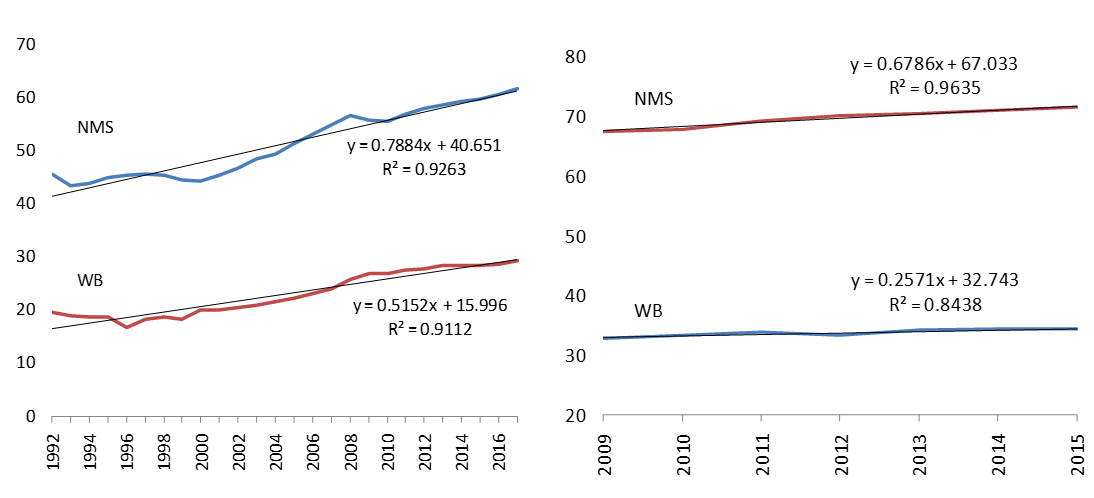 Six states in the Western Balkans – Albania, Bosnia and Herzegovina, Kosovo, Macedonia, Montenegro and Serbia – have aspirations to join the European Union. These six states have implemented policies aimed at developing convergence with the EU in terms of their political systems, their economies, and their compatibility with EU law (the acquis communautaire). Fatmir Besimi presents a comprehensive analysis of the progress of both these states and the states that have joined the EU since 2004. He highlights three key conclusions: that convergence is a persistent and stable long-term process; that structural reforms have a positive impact on convergence; and that EU membership enhances convergence.
Six states in the Western Balkans – Albania, Bosnia and Herzegovina, Kosovo, Macedonia, Montenegro and Serbia – have aspirations to join the European Union. These six states have implemented policies aimed at developing convergence with the EU in terms of their political systems, their economies, and their compatibility with EU law (the acquis communautaire). Fatmir Besimi presents a comprehensive analysis of the progress of both these states and the states that have joined the EU since 2004. He highlights three key conclusions: that convergence is a persistent and stable long-term process; that structural reforms have a positive impact on convergence; and that EU membership enhances convergence.

Speech at the 2015 Western Balkans Summit – the 2017 summit was held on 12 July, Credit: EEAS (CC BY-NC 2.0)
EU integration has been an important process of economic, political and social transformation in the Western Balkans, with efforts being made toward facilitating convergence with the European Union. In the last 25 years, evidence from the Western Balkans and Central and Eastern Europe shows that there was increasing convergence with the EU average level of living standards during the transition period of the 1990s and later through the EU integration process.
However, there is still a gap compared to EU living standards and the economies of the Western Balkans need to grow faster in order to catch up to the EU level. Also, in recent years this convergence has slowed down, while the period following the late-2000s financial crisis has seen a slower catching up process in the Western Balkans than has been the case for new EU member states who joined the EU in the most recent enlargements. This picture is shown below in Figure 1.
Figure 1: GDP per capita convergence and the catching up process in the Western Balkans and the new EU member states (click to enlarge)
Note: The line marked “NMS” refers to the new member states who joined the EU between 2004 and 2013. The line marked “WB” refers to the Western Balkans region. Each line indicates how GDP per capita in the two groups changed in relation to the EU’s average GDP per capita. Source: Compiled by the author using Eurostat data.
The challenge is how to accelerate the EU integration process and economic convergence of the Western Balkans with the European Union. This assumes structural reforms to enhance competitiveness of economies in the region. However, as stated by the IMF, “the process of structural transformation began to stall in the mid-2000s, in the face of vested interests and as reform fatigue set in, and remains incomplete.” In addition, as the EU enlargement process is taking longer, research has shown that “long-term challenges remain, such as the possibility of a slowdown in reforms”. Analysing across the Copenhagen convergence criteria, the evidence from the Western Balkans shows that countries from the region have shown cumulatively slower progress in fulfilling political criteria compared to the economic criteria and the approximation with the European ‘Acquis’, as demonstrated in Figure 2 below.
Figure 2: How Western Balkans states rate on the Copenhagen convergence criteria in terms of both ‘progress’ towards and ‘readiness’ for EU accession (2016)
Note: The scores for ‘readiness’ and ‘progress’ are based on a five point scale. For readiness, the numbers refer to: 1 – early stage; 2 – satisfactory; 3 – moderate; 4 – good; 5 – advanced. For progress, the numbers refer to: 1 – backsliding; 2 – stagnating; 3 – moderate progress; 4 – good progress; 5 – very good progress. Source: Author’s illustration based on data from European Commission
Structural reforms: A positive impact on catching up, but this effect varies over time and for different reforms
There is a growing literature on the impact of structural factors on convergence, though mostly on larger panels of countries. The IMF has found a positive relationship between structural reforms and increased productivity and convergence, while other studies have found that reform priorities for sustaining convergence vary with income levels. The results from these studies indicate that productivity dividends depend on where a country is in the development process, highlighting the need for calibrating reforms to the stage of economic development. As economies and the financial structures develop and become more sophisticated, reform payoffs and priorities shift.
Looking over the longer term, empirical analysis finds that the productivity payoffs vary across reforms and over time. The results also suggest that the benefits of reform tend to become more pronounced when reforms are bundled together. Moreover, the experiences from different countries hint at potential lessons for effective reforms, including the importance of strong ownership, the ability to sustain reforms, and the need for complementary macroeconomic and structural policies. Namely, policy reforms may have nonlinear effects that can be contingent on the quality of political and economic institutions.
Several issues in the literature related to the EU enlargement of the Western Balkans remain unresolved: namely, whether specific structural reforms will allow states to catch up with EU living standards. As Peter Sanfey and his co-authors state, “the key issue is whether the Western Balkans countries can narrow the gap in the coming decade and, if so, what do they need to do to achieve this.” For the IMF, “preserving macroeconomic stability is paramount for durable growth… Embarking a new on deep structural reform is a key policy priority for the region.” It is also stated clearly by the European Commission that “enlargement needs to be understood as a process which supports reform and the fundamental changes needed to meet the obligations of EU membership… Enlargement can only be of benefit to the EU and to partner countries if there is genuine, sustainable reform. Through this process countries will become fully ready to join the EU and be able to reap the benefits and assume the obligations that arise from membership.”
Endogeneity: EU membership has a positive impact on economic convergence
Following the above empirical investigations, a regression analysis can be conducted on the impact of structural reforms on convergence for the Western Balkans and the new EU Member States for the period between 1996 and 2014. To investigate this impact, I have examined 25 panel data regressions.
In order to cover more aspects of structural reforms, I also examined three sets of regressions on the impact of reforms on convergence: world governance (voice and accountability, political stability, regulatory quality, governance effectiveness, rule of law, control of corruption); transition indicators (large scale privatisation, small scale privatisation, governance and enterprise restructuring, price liberalisation, trade and forex system, competition policy); and global competitiveness indicators (institutions, infrastructure, macroeconomic environment, health and primary education, higher education and training, goods market efficiency, market size, labour market efficiency, financial market development, technology readiness, market size, business sophistication).
Also, of research interest was to examine the impact of the EU membership on convergence in order to assess the endogeneity of the integration process. Since, I consider dynamic panel data, I also introduce lags of the dependent variable for better specification of the model. The results of this analysis suggest the following three findings: convergence is a persistent and stable long-term process; structural reforms have a positive impact on convergence; and EU membership enhances convergence.
Following the above literature review and empirical analysis we may conclude with the following three policy remarks. First, convergence is a persistent process, while the cumulative impact of autocorrelation is positive and stable, there is a negative autocorrelation coefficient of the second lag which may be speculated as being a reflection of the fractional negative impact of structural reforms on convergence due to the distribution effect and vested rents of certain interest groups in society. The latter opens the floor for debates on the political economy of structural reforms and EU integration (which I have developed in a theoretical model in ongoing joint research with Vassilis Monastiriotis that also covers the impact of the European Commission on the performance of structural reforms).
Second, structural reforms have a positive impact on convergence as a long-term process, while the impact varies across reforms and over time and their impact is also non-linear dependent on the quality of political and economic institutions. Finally, the evidence shows that EU membership has had a significant positive impact on convergence for new Member States, which highlights the endogeneity of the EU integration process. Thus we may suggest that the EU can play a role in enhancing credible structural reforms and further convergence of the Western Balkans with the EU. Hence, a continuation of the ‘new approach’ and new initiatives for support from the EU will accelerate the reforms, allowing the Western Balkans to catch up with the EU.
Please read our comments policy before commenting.
Note: This article gives the views of the author, and not the position of EUROPP – European Politics and Policy, nor of the London School of Economics.
_________________________________
 Fatmir Besimi – LSE
Fatmir Besimi – LSE
Fatmir Besimi is a Visiting Senior Fellow at LSEE – Research on Southeastern Europe in the LSE’s European Institute. He was formerly Macedonia’s Deputy Prime Minister for European Affairs (2013-2016), Minister of Defence (2011-2013) and Minister of Economy (2004-2006; 2008-2011).






